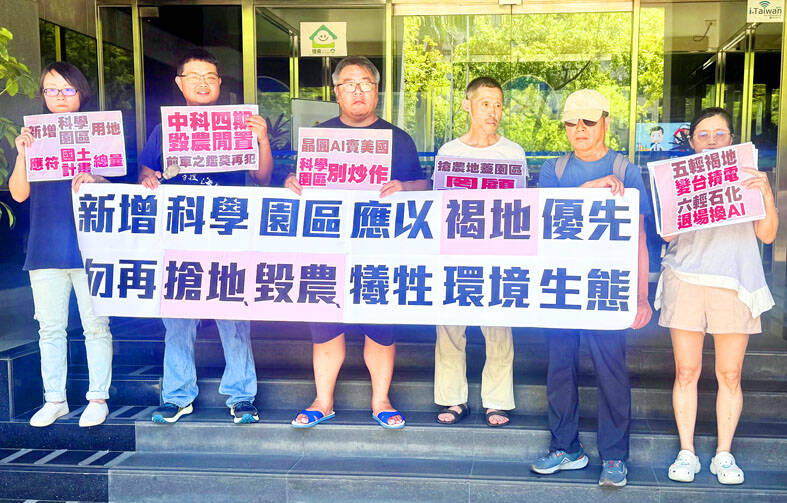National spatial planning should not be reduced to a supportive scheme to land development policies, environmental groups told a news conference yesterday, urging the government to prioritize brownfield instead of farmland in constructing new scientific parks.
The National Science and Technology Council (NSTC) — then the Ministry of Science and Technology — designated an additional 1,000 hectares of land for scientific park use when the Executive Yuan approved the National Spatial Plan in 2018.
The effort was continued in a strategic environmental assessment (SEA) report of scientific park development initiatives proposed by the NSTC in May based on the Taoyuan-Hsinchu-Miaoli Great Silicon Valley Plan and the Greater Southern New Silicon Valley Promotion Plan, with 2,000 hectares more to be added by 2050.

Photo: Huang Yi-ching, Taipei Times
The 1,000 hectares to be allocated by 2036 — which would increase the total scientific park land use to 5,440 hectares — might not be sufficient for actual industrial demand, given that current land for scientific park use, either in operation or under planning or development, has reached 5,341 hectares nationwide, the report said.
Therefore, 2,000 hectares more are required to boost the total area to 7,440 hectares to maintain Taiwan’s leading status in the global semiconductors and artificial intelligence sectors by providing enough land for new plants, it said.
Government Watch Alliance chief executive officer Hsu Hsin-hsin (許心欣) said the land chosen for the two “Silicon Valley” plans does not accord with local land use zoning in each administrative area.
The NSTC should not encroach on farmland for scientific park development in breach of the National Spatial Plan, she said.
Hsu cited Central Taiwan Science Park’s (CTSP) Erlin Science Park as an example, saying that agricultural workers were forced to leave the region when the government expropriated more than 600 hectares of farmland to build the park.
However, the science park has been left unused with few companies moving in, she said.
Hsu cited Taiwan Hsinchu Foundation chairman Sam Lin (林聖崇) as saying that brownfield — polluted land — should be prioritized in scientific park land use.
For example, Taiwan Semiconductor Manufacturing Co has set up new plants at CPC Corp, Taiwan’s polluted plant sites in Kaohsiung’s Houjin (後勁) areas, Lin was cited as saying.
Eyes on Pollution of CTSP secretary-general Hsu Wan-ling (徐宛鈴) said the newly proposed land addition should adhere to national spatial planning.
She also cited the National Land Management Agency as saying at the previous environmental impact assessment (EIA) meeting that “national spatial planning would be adjusted based on SEA conclusions.”
National spatial planning should not be reduced to supportive schemes for the Executive Yuan’s or the NSTC’s policies, Hsu Wan-ling said.
The NSTC yesterday said that allocating more land for potential industrial demand is necessary to retain high-tech industries and relevant investments in Taiwan.
The proposal is at its preliminary stage and further environmental impact assessments, as well as prior communications with local stakeholders, would be conducted for each scientific park construction project, it said.
The EIA committee yesterday at a meeting requested that the use of polluted land be prioritized in future scientific park developments.

The manufacture of the remaining 28 M1A2T Abrams tanks Taiwan purchased from the US has recently been completed, and they are expected to be delivered within the next one to two months, a source said yesterday. The Ministry of National Defense is arranging cargo ships to transport the tanks to Taiwan as soon as possible, said the source, who is familiar with the matter. The estimated arrival time ranges from late this month to early next month, the source said. The 28 Abrams tanks make up the third and final batch of a total of 108 tanks, valued at about NT$40.5 billion

Two Taiwanese prosecutors were questioned by Chinese security personnel at their hotel during a trip to China’s Henan Province this month, the Mainland Affairs Council (MAC) said yesterday. The officers had personal information on the prosecutors, including “when they were assigned to their posts, their work locations and job titles,” MAC Deputy Minister and spokesman Liang Wen-chieh (梁文傑) said. On top of asking about their agencies and positions, the officers also questioned the prosecutors about the Cross-Strait Joint Crime-Fighting and Judicial Mutual Assistance Agreement, a pact that serves as the framework for Taiwan-China cooperation on combating crime and providing judicial assistance, Liang

A group from the Taiwanese Designers in Australia association yesterday represented Taiwan at the Midsumma Pride March in Melbourne. The march, held in the St. Kilda suburb, is the city’s largest LGBTQIA+ parade and the flagship event of the annual Midsumma Festival. It attracted more than 45,000 spectators who supported the 400 groups and 10,000 marchers that participated this year, the association said. Taiwanese Designers said they organized a team to march for Taiwan this year, joining politicians, government agencies, professionals and community organizations in showing support for LGBTQIA+ people and diverse communities. As the first country in Asia to legalize same-sex

MOTIVES QUESTIONED The PLA considers Xi’s policies toward Taiwan to be driven by personal considerations rather than military assessment, the Epoch Times reports Chinese President Xi Jinping’s (習近平) latest purge of the Chinese People’s Liberation Army (PLA) leadership might have been prompted by the military’s opposition to plans of invading Taiwan, the Epoch Times said. The Chinese military opposes waging war against Taiwan by a large consensus, putting it at odds with Xi’s vision, the Falun Gong-affiliated daily said in a report on Thursday, citing anonymous sources with insight into the PLA’s inner workings. The opposition is not the opinion of a few generals, but a widely shared view among the PLA cadre, the Epoch Times cited them as saying. “Chinese forces know full well that